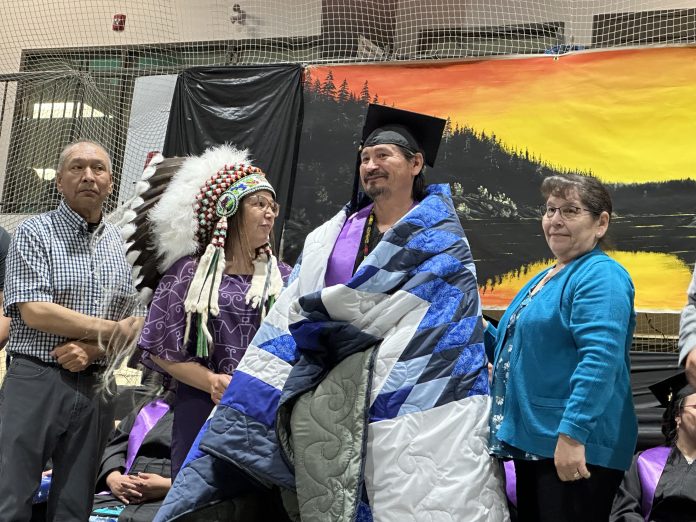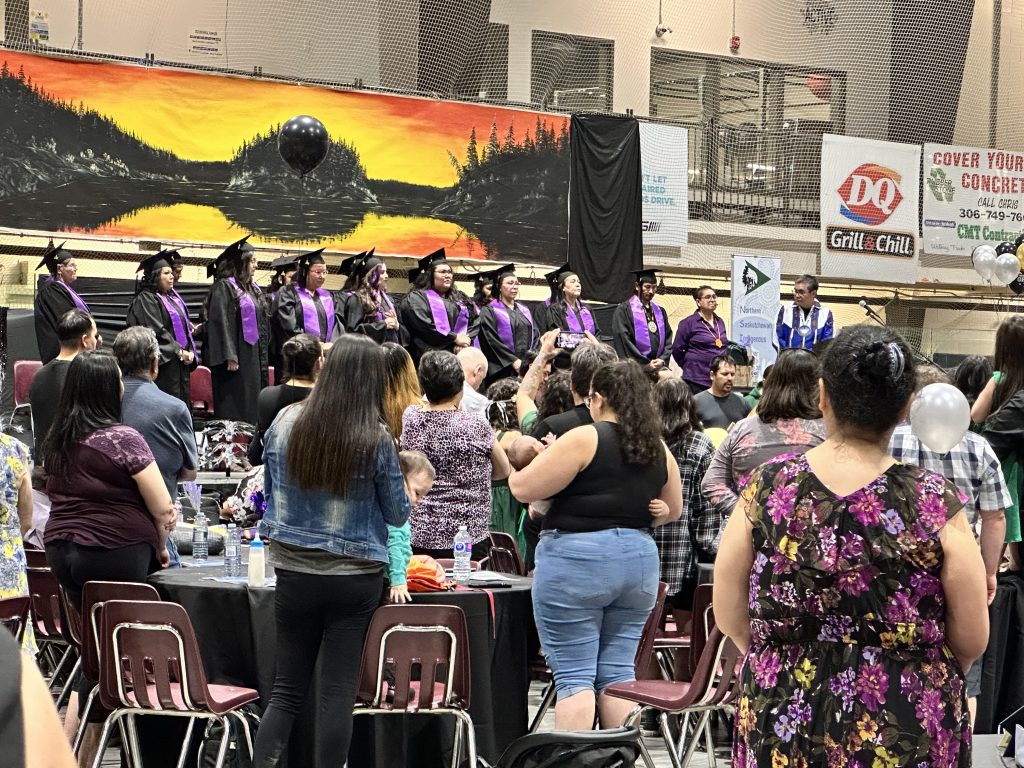
The Northern Saskatchewan Indigenous Teacher Education Program (NSITEP) celebrated the first graduation May 18 since the initiation of the program in 2019.
Dr. Morris Cook, director of the program, acted as MC for the graduation celebrations, which began with Gabe Andrews introducing the 17
graduates as they entered the hall at the Jonas Roberts Memorial Community Centre (JRMCC) and made their way to the stage.
Ceremonies began with prayers by Elders, Josie Searson and Eleanor Hegland, who congratulated the graduates.
The Northern Boys, a drum group from Stanley Mission, offered an Honour Song for the graduates.
Cook spoke about his experience working with the program and students over the past four years, the highlights and challenges and noted several people who were instrumental in bringing NSITEP together in 2019.
In the four years to the present. “We currently have 60 plus fulltime teacher education students,” he said.
NSITEP was created through a partnership between the Lac La Ronge Indian Band (LLIRB), Gabriel Dumont Institute (GDI), and the University of Regina.
Cook also introduced several people who were part of bringing the partnership together, including: Chief Tammy Cook-Searson; Geordie Mcaffrey, former President/CEO of GDI, who was” part of the visioning: for the program; Dr. Jerome Cranston, Director of Education for the University of Regina, who were all present for the graduation ceremonies. LLRIB Councillor Sam (Chox) Roberts, who “spent a lot of time behind closed doors ironing out the details.” To get the program started in the community.
Cook also spoke of his family roots on the trapline and the importance of the values he learned there and that they continue to be passed on to future generations.
“Education represents values, values of democracy and fairness, education and economic opportunity, professional voice and agency for all. Values that have endured from generation to generation in this country. But, not always accessible to Indigenous people. Look at it; there they are,” he said, referencing the graduates, adding, “we still have a ways to go,” noting the responsibility and opportunity for the new grads and the students coming behind them.
Lisa Bird-Wilson, CEO for GDI, congratulated the grads and spoke about the value of the partnership that brought the program in their coming together “to fill this important need for educations in the north.”
And speaking to the Grads, she said, “Yours is fulfilling a dream and a vision for Indigenous education in Saskatchewan … a dream that our kids are going to have role models in the schools. That they are going to see themselves reflected in the school curriculum and that they are going to be welcomed and encouraged to stay in school and complete their education.”
“We’re so proud of each and every one of you … please take time to celebrate cause this is a great achievement,” Cook-Searson said to the students.

Cranston spoke about the partnership formed to bring NSITEP together that is strong in the light of “the fact that the program is officially located on the sovereign territory, the nation of the Lac La Ronge Indian Band in many ways secures that no federal or provincial authority has the right to take something away from you.”
He spoke of the importance of the support families offered to the students, particularly through the pandemic.
And to the Grads he said, “You will change the world. Yu will change the world for brown skin kids and black skin kids and all kinds of kids … and you will change the perception they have of what First Nation and Métis [people] are capable of … Congratulations, we are so proud of you.”
Bird-Wilson and Métis Nation-Saskatchewan President Glen McCallum presented the Graduates with sashes.
Cook-Searson and LLRIB Council members wrapped each graduate individually in Star Blanket quilts.
Graduate Sandra McKenzie received the Creative Creations Award, presented by Glenn and Nancy Lafleur. She received a ribbon skirt, made by Nancy Lafleur in honour of her grandmother and a $320 scholarship.
The athwipi Award, consisted of a chair, which sat in Nancy Lafleur’s office over the three years she taught with NSITEP. The chair was used by many to share stories, tears, laughter. “This chair has carried the emotions of many,” Lafleur said.
The chair went to graduate Megan Roberts. “Megan, today I pass this chair on to you. I know that it will sit in your classrooms and many stories will find it. I know it will be the chair that will sipe away tears and it will be the chair that will share a smile and it will be the chair that will make the little soul feel safe and it’ll be surrounded with love and care that you will give it.”
The iskatēw Community Fires Award was awarded to the lone male graduate, Ronnie McKenzie for his work of including language and culture into his teaching opportunities throughout his time at NSITEP.
The 17 graduates are: Becky Aubichon; Shalene Bird – distinction; Tracey Bouvier; Jolene Coouillonneur – Distinction; Carmen Fiddler; Glenda Lariviere; Leona Lariviere – Distinction; Olivia MacDonald – Distinction; Rita McKenzie; Ronnie McKenzie; Sandra McKenzie; Denise McLeod – Great Distinction; Jasmine Natomagan; Nikki Natomagan – Distinction; Dolly Ratt – Distinction; Megan Roberts – Distinction; and Mary Venne.

